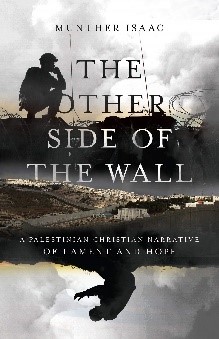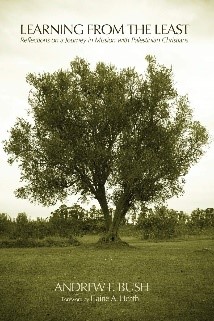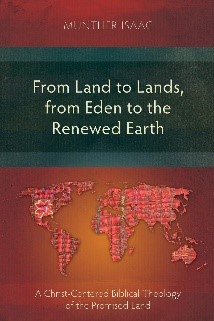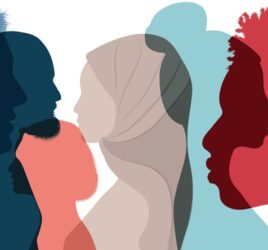Whose voices do you listen to most? To whom do you give a voice?
In a world of increasing polarization – cultural, political, economic, religious – giving a voice to others requires considerably more intentionality, and a preparedness to be judged by those who prefer the simplicity of the “them and us” world. We listen to those who are “one of us” and ignore those who are “one of them”. And so, our own world shrinks, and our fears increase.
I want to urge you to read one of the best books I have read, and I have read a lot of good books! Munther Isaac (2020), The Other Side of the Wall: A Palestinian Christian Narrative of Lament and Hope, IVP.
The Other Side of the Wall: A Palestinian Christian Narrative of Lament and Hope, IVP.
Munther Isaac is a Palestinian Christian, an Evangelical, a lecturer at the Bethlehem Bible College, and with a PhD through the Oxford Centre for Mission Studies (OCMS). Munther writes passionately and with much theological and ethical depth about Palestinian voices. But first some more general comments on the voice of the voiceless.
There is a pivotal moment in the movie “The King’s Speech” when King George VI cries out “I have a voice!” The point was not so much about being King but simply because he was a man, human, and as such had a fundamental right to speak and be heard.
The voiceless of our world are legion. The agenda of who gets to be heard is too readily determined by the wealthy and powerful, the politicians, the media, the most vocal, and church leaders. The marginalized, those without the resources to make themselves heard, the powerless, the less articulate…. are all so often overlooked if not intentionally ignored.
Christians are not much better, sometimes even worse. We read the books of those like us, our theological camp, our culture, our agenda, our denomination. We go to the conferences, engage online, seek out for conversation those we have already pretty much agreed with. Too readily we dismiss or even demonize those who are different theologically, politically, ecclesiastically, culturally. We are pretty good at eating one another with harsh words, shooting the messenger or applying ridiculous labels to what we assume they want to say.
Those in the minority know they mostly will not be listened to, not given the time to be heard well. So consequently, many stay silent. It is the squeaky wheel that gets the grease/oil and the more articulate exploit this well.
Leaders of international churches (ICs) cannot afford to be selective in who we listen to, who gets to be heard. ICs by their very nature are multi-everything communities, inclusive of multiple diverse voices. When IC leaders listen more to those like themselves, many in the church are effectively silenced. While in some cultures speaking up is encouraged, in many it is not. Only when leaders actively, intentionally, give time to, set out to hear well the stories of others do many get a real voice in the church.
And it does take time. The voiceless know the score. They have already experienced the superficial, half-interested, quick attempts by others to listen. They wait before speaking up. What’s the point? Wait and see and maybe the miracle will come, and someone will actually genuinely and authentically desire to listen for as long as it takes, without prejudice, without judgement, without interruption, without ignorant solutions.
Fortunately, there are many in ICs who do listen to those who are different, who have difficulty articulating their stories, who hesitate because they know their story does not fit with the mainstream perspectives of the most vocal in the church, the leaders.
ICs exist in contexts, powerful influences both surround each and every IC and live within them. We are not in some monochrome bubble of a nice, middle-class suburb. We are in the international world of conflicting nationalisms, theological diversity, geo-political realities and ideologies, stories of suffering and heartache. We are in the world where the rich and powerful dominate the agendas, all for their own gain. Exceptions exist but even so the marginalized, the poor, the voiceless, the oppressed, the enslaved, the abused and violated, the stateless, are at best treated as pawns in the geo-political games of the ambitious.
Truth certainly is the first casualty of war. And truth is the first casualty of our failure to give voice to the voiceless, …. our neighbours…
This is why Munther’s book is so crucially indispensable, he gives voice to some of the most voiceless people on the planet. Not that they do not speak, they are just shut off from being heard.
I remember well a sermon Munther preached at OCMS on The Good Samaritan. Perhaps the best I have ever heard on the passage. He captured the point so well. As soon as we are selective on who is our neighbour, we have ceased to be people of love. When our thinking and responses are shaped by the question, “Are you one of us or one of them?” we are no longer treating all persons equally as our neighbour. What does it mean to love our enemies but to love them as neighbours, as friends?
Munther’s book is more about justice, truth, neighbourliness, theology, ethics, and peace than it is about being just another opinion on the Middle East. His passion is to give voice to Palestinian Christians, to be heard, to cry out for neighbourliness from fellow-believers at least. There is a deep maturity in his words, the maturity that come from a life-time of heartache and being marginalized by the majority of the Christian West.
The book is both forthright and informative, a moving challenge to the status quo of Evangelical thought, a refusal to be dismissed and not heard simply because Palestinian brothers and sisters do not fit comfortably with the eschatological presumptions of others.
Munther’s ancestors have lived, farmed, developed communities, and loved their land for centuries. Palestinian Christians have lived on the land for 2,000 years. Sadly, the last hundred years have decimated the Christian presence in Palestine, as with other Middle Eastern countries. Hundreds of thousands of olive trees, carefully loved and cultivated over centuries have been destroyed. Thousands of homes have been destroyed. They have been squeezed out, robbed of the land God entrusted to them.
Yet Munther argues strongly against the way we so easily take up stereotypical generalizations about others. Across the Jewish, Muslim and Christian communities of the Middle East, there is great diversity. The traditions of grace and hospitality, neighbourliness and acceptance and mutual help, are strong in all three. The majority hate the ways in which division, violence, inequality and injustice have prevailed so much over the last century.
The Kingdom of God is the framework that Munther works from. Ultimately the Kingdom is one in which multiple voices unite together in community. People from multiple languages, ethnicities, cultures, from every “tribe, language, people and nation” joined together in neighbourliness This unity requires peace, justice and equality just as much in the Israel/Palestine struggles as anywhere else.
struggles as anywhere else.
Palestinian Christians have so much to teach us if only we would listen, not so much about the crises that pervade their world but simply how to be Christian in the midst of great hardship.
I am reminded of another book that argued likewise. Andrew Bush, a USA missionary who went to live In Palestine, discovered he had much to learn from and appreciate in the depth of Christ-like maturity he found in the Palestinian community. I also commend this book to you as it also influenced my thinking on being Christ-like in the real world of suffering. Andrew Bush (2013), Learning from the Least: Reflections on a Journey in Mission with Palestinian Christians, Cascade Books.
You would have noticed that I used the word “Palestine” to refer to this land. I am not denying the existence of the nation state of Israel but simply preferring to use the word that has been used of this land long before this Israel came to be. For example, in reading the works of TE Lawrence (“Lawrence of Arabia”) I noticed that he refers to this land as “Palestine”.
Lastly, may I also commend to you another of Munter’s books. This is the published version of his PhD thesis. It too is a valuable read. It does not address the current crises in his homeland but develops the mega-narrative of God’s creation project from the Garden of Eden to the renewed coming together of heaven and earth in Revelation 21-22. I found this book a very helpful addition to the several publications in recent years that follow the same Kingdom of God journey.
Munther Isaac (2015), From Land to Lands, from Eden to the Renewed Earth: A Christ-Centred Biblical Theology of the Promised Land, Langham Monographs.
Graham Chipps



